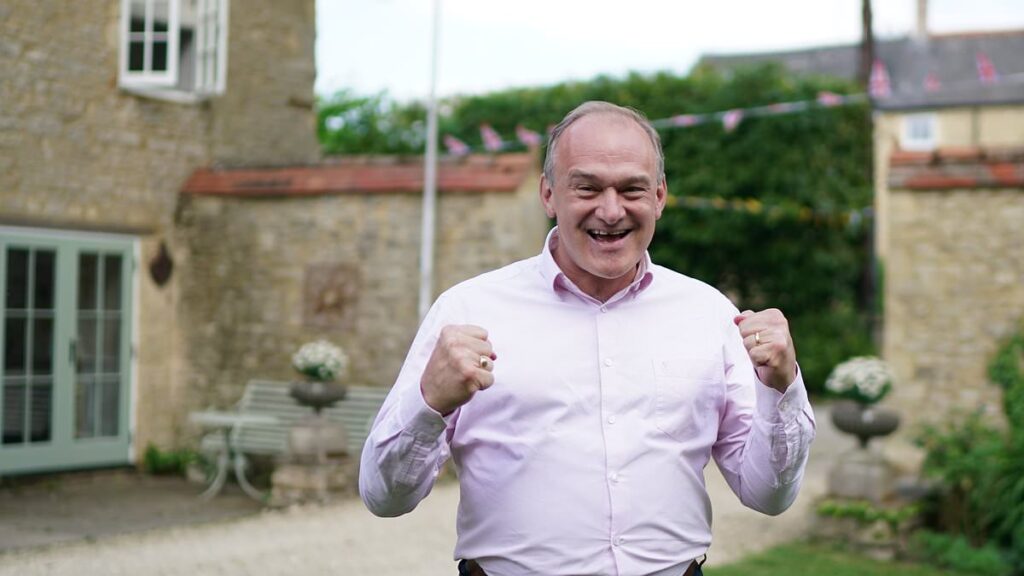Britain is now a five-party state, a polling guru said yesterday as the Liberal Democrats and Greens gained scores of councillors in the local elections.
By last night the Lib Dems had won control of Oxfordshire, Cambridgeshire and Shropshire councils, gaining at least 158 councillors – claiming they have replaced the Tories as the ‘party of Middle England’.
The Greens gained 43 councillors, with major wins in Devon, Warwickshire and Gloucestershire.
Yesterday Green Party co-leader Adrian Ramsay said the ‘main message’ from the election was that Britain is now in a ‘five-party system and the future of British politics is wide open’.
Asked about his claim, Professor Sir John Curtice told BBC Radio 4’s Today programme that it was ‘a fair comment’.
‘You can see it illustrated in some of the big contests, those big mayoral contests,’ said the senior research fellow at the National Centre for Social Research.
Asked about his claim, Professor Sir John Curtice told BBC Radio 4’s Today programme that it was ‘a fair comment’.
Britain is now a five-party state, a polling guru said yesterday as the Liberal Democrats and Greens gained scores of councillors in the local elections. Pictured: Liberal Democrat Leader Sir Ed Davey at a garden party to celebrate the local election results
By last night the Lib Dems had won control of Oxfordshire, Cambridgeshire and Shropshire councils, gaining at least 158 councillors – claiming they have replaced the Tories as the ‘party of Middle England’. Pictured: The first ballot box arrives for the Runcorn and Helsby by-election at the DCBL Stadium on May 1
The Greens gained 43 councillors, with major wins in Devon, Warwickshire and Gloucestershire. Yesterday Green Party co-leader Adrian Ramsay (pictured) said the ‘main message’ from the election was that Britain is now in a ‘five-party system and the future of British politics is wide open’
‘The West of England, won with 25 per cent of the vote, and another one won with just 30 per cent of the vote. True, Andrea Jenkyns managed to win with 42 per cent of vote.
‘Now, of course, when you’ve got five-party politics that doesn’t necessarily mean to say that five parties are equally strong everywhere.
‘But the point is that all of these parties do now have their areas of strength.
‘They have sections of the electorate they can appeal to, geographies they can appeal to.
‘You therefore see that when you have an election over a broad area, like the West of England, then you end up with all the parties getting between 15 per cent and 25 per cent of the vote.’
While on the programme Curtice also warned Labour and the Conservatives have failed to grasp the ‘fundamental social change’ in their support.
Curtice said: ‘Conservative and Labour, historically, were two parties embedded in the system of social class. Conservatives won middle-class voters, Labour won working-class voters.
Asked about his claim, Professor Sir John Curtice (pictured) told BBC Radio 4’s Today programme that it was ‘a fair comment’
While on the programme Curtice also warned Labour and the Conservatives have failed to grasp the ‘fundamental social change’ in their support
Curtice said: ‘Conservative and Labour, historically, were two parties embedded in the system of social class. Conservatives won middle-class voters, Labour won working-class voters’
‘That is not true any more. For example, the core Labour voter in our society now is the young, middle-class professional living in London, it is not the coal miner living in Durham.
‘That is a fundamental social change and it is not entirely clear that either of our two biggest parties have really accommodated themselves to the changing environment in which they find themselves.’
Analysis by YouGov of voting at the 2024 election suggested a similar trend.
It found that Labour ‘comfortably outperformed’ the Conservatives among voters in both the higher and lower social grades.
